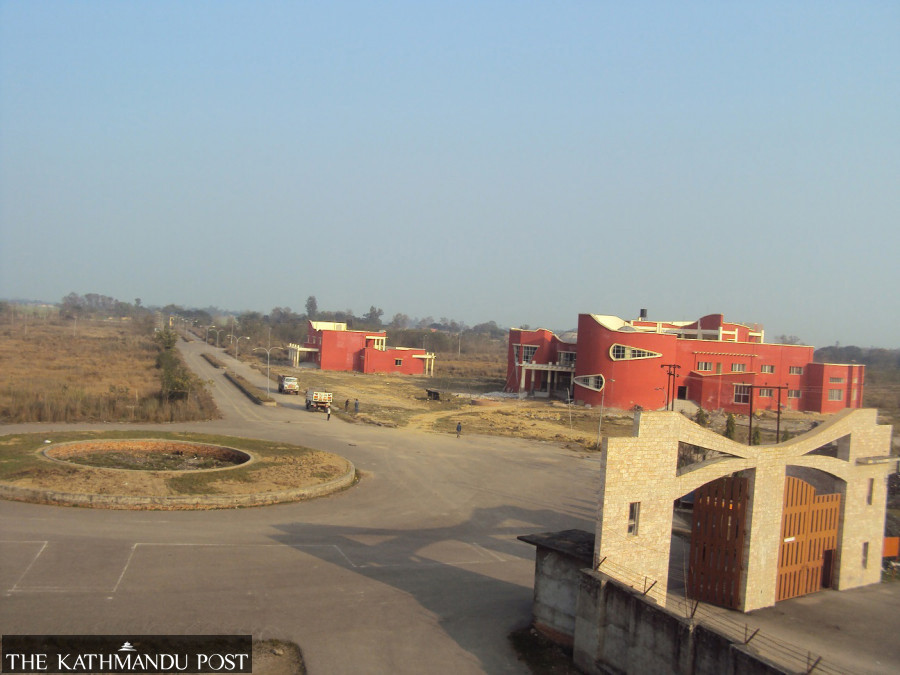Money
Shakti Minerals in trouble for missing export quota
Factories housed in the SEZ are required to export at least 60 percent of their production, according to the Special Economic Zone Act.
Madhav Dhungana
Shakti Minerals located inside the Bhairahawa Special Economic Zone (SEZ) has got into trouble with the area authorities after failing to fulfil its export quota.
According to the SEZ Act, factories housed in the SEZ are required to export at least 60 percent of their production. Originally it was 75 percent; the requirement was slashed in 2019 following an amendment to the law.
Last Tuesday, SEZ authorities stopped Shakti Minerals, which produces limestone grit and powder used to make poultry feed, from selling its products in the domestic market for missing its export quota.
Entrepreneurs based in the SEZ said that they had been falling behind because of the Covid-19 pandemic which prevented them from meeting their regular production and export targets.
Shakti Minerals, the first factory to be established in the SEZ with an investment of Rs400 million, has also stopped exporting its products to India from Wednesday.
The factory has been reported to have achieved only 6.5 percent of its export quota in the first four months of the current fiscal year, while the company claims that exports amounted to 17 percent.
Deepak Jha, proprietor of Shakti Minerals, said they had been having a hard time for the last two years due to the Covid-19 pandemic, resulting in reduced output.
"Sales of our products in the domestic market were abruptly stopped without prior notice, charging that 60 percent of the produced goods were not exported," he said.
“We have suffered from the coronavirus, and now the SEZ authorities are making life difficult. They are not making it easy for us,” Jha said.
Shakti Minerals shipped products worth Rs1.76 million to India in the first four months of the current fiscal year, and sold goods worth Rs25.3 million in the domestic market, according to the factory.
"The SEZ is not paying attention to providing the facilities it has promised," Jha said.
The much-hyped Bhairahawa SEZ located in south central Nepal was built in 2003, and its administrative building was inaugurated in November 2014, that is, a full 11 years after construction started, by then deputy prime minister and home minister Bam Dev Gautam and industry minister Mahesh Basnet.
In 2017, the then industry minister Nabindra Raj Joshi inaugurated the facility for the second time.
Nearly two decades on, officials at the special economic zone claimed that construction work would be completed by this fiscal year which ends mid-July.
Jha said that there was no facility of electricity, water, telephone, street lights, customs facility, one-window system and other facilities as mentioned in the SEZ Act.
He said the government had failed to provide the necessary infrastructure and facilities. In recent days, the company's daily exports amount to around Rs200,000 and domestic sales total Rs400,000 daily.
Exports have been improving in recent days, as per the company.
Jiban Poudel, chief of the Bhairahawa SEZ, said that Shakti Minerals had been prevented from selling and distributing its goods in the domestic market as it has not fulfilled its export quota as per the law.
"The factory should increase exports," he said, adding that the factory needed to operate according to the purpose for which it was set up.
As per SEZ objectives, there should be a provision of one-stop service from registration to production and export. But that’s a distant dream for the operators inside the SEZ, industry entrepreneurs said.
There are few takers for the industrial plots at the export-oriented enclave, and the estate lies semi-completed even though many ministers have come and gone in these years.
The special zone in Bhairahawa is spread over 52 bighas, and contains 69 industrial plots ranging in area from 1,400 to 3,700 square metres.
The SEZ Act was amended two years ago, but the regulations have not been changed accordingly. The process of amending the regulations is ongoing, and it remains unclear what kind of factories will be allowed to operate inside the zone until they are completed.
Many entrepreneurs have cancelled their agreements to operate plants complaining that even the minimum infrastructure was not available.
According to the SEZ authorities, only 22 out of the 69 plots allotted for industry have been utilised. Agreements to set up 22-23 factories have been signed, but construction has not started. Other plots lie vacant as no takers have come forward.
There are also complaints that the infrastructure has been overgrown with weeds and that people are scared to walk around the forlorn looking SEZ even during the day time, according to entrepreneurs.
A big chunk of the budget has been spent annually for the last seven years in the name of maintenance. The trend of ministers visiting the premises every year and making lofty promises has not stopped.




 9.7°C Kathmandu
9.7°C Kathmandu















